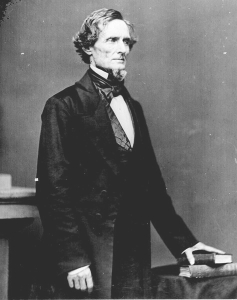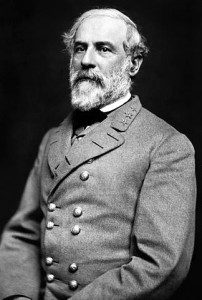His Home State of Mississippi Seceded On January 9, 1861
“My own convictions, as to negro slavery are strong, It has its evils and abuses…. We recognize the negro as God and God’s Book and God’s Laws, in nature, tell us to recognize him–our inferior, fitted expressly for servitude…. You cannot transform the negro into anything one-tenth as useful or as good as what slavery enables them to be.”
…Jefferson Davis
Those are the ugly words of Jefferson Davis to a northern friend after Davis became president of the Confederacy. They are especially ugly for us to read today.
We have to consider that Davis was a man living in his times and not ours, but that is not meant to justify or excuse him. What other words should we expect to come from the president of the Confederate States of America, the president of a collection of states which seceded from the Union and went to war to preserve slavery? Mississippi’s secession, which Davis supported, led to his resignation from the United States Senate. Jefferson Davis believed that all men are not equal, that slaves were not equal to whites, and his Farewell Address to the United States Senate emphasized his beliefs.
In January, 1861, Jefferson Davis was fifty-three-years-old and his health was poor. He had served the United States as a Congressman, led Mississippi volunteers in the Mexican War and was wounded at the Battle of Buena Vista, was a Senator, and was Secretary of War under Franklin Pearce. Davis was a Democrat and a strong supporter of States’ Rights, and in favor of Mississippi’s secession from the Union. Earlier in life, he had been a slave owner at the Davis family’s Mississippi plantation. Compared to other slave owners, the Davises were known to treat their slaves well, but they thought the slaves to be their private property, that they were inferior to whites, and as a race only suited for servitude.
On January 21, 1861, Jefferson Davis was standing at a podium in the Senate Chamber at the United States Capitol. Now it was time for Davis to resign as a United States senator and return home to Mississippi, now part of the Confederate States of America. He was there to say farewell, or “adieu” as he would say in his emotional speech.
Jefferson Davis’ six-year term as president of the Confederate States of America was cut short. The Union won the Civil War after four years of bloody war and hell on earth. The Union was preserved, the Confederacy failed, and the United States bid “adieu” to the peculiar institution of slavery.
Jefferson Davis’ Farewell Speech to the United States Senate
Senate Chamber, United States Capitol, January 21, 1861

Jefferson Davis
“I rise, Mr. President, for the purpose of announcing to the Senate that I have satisfactory evidence that the State of Mississippi, by a solemn ordinance of her people in convention assembled, has declared her separation from the United States. Under these circumstances, of course my functions are terminated here. It has seemed to me proper, however, that I should appear in the Senate to announce that fact to my associates, and I will say but very little more. The occasion does not invite me to go into argument; and my physical condition would not permit me to do so if it were otherwise; and yet it seems to become me to say something on the part of the State I here represent, on an occasion so solemn as this.
“It is known to Senators who have served with me here, that I have for many years advocated, as an essential attribute of State sovereignty, the right of a State to secede from the Union. Therefore, if I had not believed there was justifiable cause; if I had thought that Mississippi was acting without sufficient provocation, or without an existing necessity, I should still, under my theory of the Government, because of my allegiance to the State of which I am a citizen, have been bound by her action. I, however, may be permitted to say that I do think she has justifiable cause, and I approve of her act. I conferred with her people before that act was taken, counseled them then that if the state of things which they apprehended should exist when the convention met, they should take the action which they have now adopted.
“I hope none who hear me will confound this expression of mine with the advocacy of the right of a State to remain in the Union, and to disregard its constitutional obligations by the nullification of the law. Such is not my theory. Nullification and secession, so often confounded, are indeed antagonistic principles. Nullification is a remedy which it is sought to apply within the Union, and against the agent of the States. It is only to be justified when the agent has violated his constitutional obligation, and a State, assuming to judge for itself, denies the right of the agent thus to act, and appeals to the other States of the Union for a decision; but when the States themselves, and when the people of the States, have so acted as to convince us that they will not regard our constitutional rights, then, and then for the first time, arises the doctrine of secession in its practical application.
“A great man who now reposes with his fathers, and who has been often arraigned for a want of fealty to the Union, advocated the doctrine of nullification, because it preserved the Union. It was because of his deep-seated attachment to the Union, his determination to find some remedy for existing ills short of a severance of the ties which bound South Carolina to the other States, that Mr. Calhoun advocated the doctrine of nullification, which he proclaimed to be peaceful, to be within the limits of State power, not to disturb the Union, but only to be a means of bringing the agent before the tribunal of the States for their judgment.
“Secession belongs to a different class of remedies. It is to be justified upon the basis that the States are sovereign. There was a time when none denied it. I hope the time may come again, when a better comprehension of the theory of our Government, and the inalienable rights of the people of the States, will prevent any one from denying that each State is a sovereign, and thus may reclaim the grants which it has made to any agent whomsoever.
“I therefore say I concur in the action of the people of Mississippi, believing it to be necessary and proper, and should have been bound by their action if my belief had been otherwise; and this brings me to the important point which I wish on this last occasion to present to the Senate. It is by this confounding of nullification and secession that the name of a great man, whose ashes now mingle with his mother earth, has been invoked to justify coercion against a seceded State. The phrase “to execute the laws,” was an expression which General Jackson applied to the case of a State refusing to obey the laws while yet a member of the Union. That is not the case which is now presented. The laws are to be executed over the United States, and upon the people of the United States. They have no relation to any foreign country. It is a perversion of terms, at least it is a great misapprehension of the case, which cites that expression for application to a State which has withdrawn from the Union. You may make war on a foreign State. If it be the purpose of gentlemen, they may make war against a State which has withdrawn from the Union; but there are no laws of the United States to be executed within the limits of a seceded State. A State finding herself in the condition in which Mississippi has judged she is, in which her safety requires that she should provide for the maintenance of her rights out of the Union, surrenders all the benefits, (and they are known to be many,) deprives herself of the advantages, (they are known to be great,) severs all the ties of affection, (and they are close and enduring,) which have bound her to the Union; and thus divesting herself of every benefit, taking upon herself every burden, she claims to be exempt from any power to execute the laws of the United States within her limits.
“I well remember an occasion when Massachusetts was arraigned before the bar of the Senate, and when then the doctrine of coercion was rife and to be applied against her because of the rescue of a fugitive slave in Boston. My opinion then was the same that it is now. Not in a spirit of egotism, but to show that I am not influenced in my opinion because the case is my own, I refer to that time and that occasion as containing the opinion which I then entertained, and on which my present conduct is based. I then said, if Massachusetts, following her through a stated line of conduct, chooses to take the last step which separates her from the Union, it is her right to go, and I will neither vote one dollar nor one man to coerce her back; but will say to her, God speed, in memory of the kind associations which once existed between her and the other States.

United States Capitol under construction in 1860.
“Then, Senators, we recur to the compact which binds us together; we recur to the principles upon which our Government was founded; and when you deny them, and when you deny to us the right to withdraw from a Government which thus perverted threatens to be destructive of our rights, we but tread in the path of our fathers when we proclaim our independence, and take the hazard. This is done not in hostility to others, not to injure any section of the country, not even for our own pecuniary benefit; but from the high and solemn motive of defending and protecting the rights we inherited, and which it is our sacred duty to transmit unshorn to our children.
“I find in myself, perhaps, a type of the general feeling of my constituents towards yours. I am sure I feel no hostility to you, Senators from the North. I am sure there is not one of you, whatever sharp discussion there may have been between us, to whom I cannot now say, in the presence of my God, I wish you well; and such, I am sure, is the feeling of the people whom I represent towards those whom you represent. I therefore feel that I but express their desire when I say I hope, and they hope, for peaceful relations with you, though we must part. They may be mutually beneficial to us in the future, as they have been in the past, if you so will it. The reverse may bring disaster on every portion of the country; and if you will have it thus, we will invoke the God of our fathers, who delivered them from the power of the lion, to protect us from the ravages of the bear; and thus, putting our trust in God and in our own firm hearts and strong arms, we will vindicate the right as best we may.
“In the course of my service here, associated at different times with a great variety of Senators, I see now around me some with whom I have served long; there have been points of collision; but whatever of offense there has been to me, I leave here; I carry with me no hostile remembrance. Whatever offense I have given which has not been redressed, or for which satisfaction has not been demanded, I have, Senators, in this hour of our parting, to offer you my apology for any pain which, in heat of discussion, I have inflicted. I go hence unencumbered of the remembrance of any injury received, and having discharged the duty of making the only reparation in my power for any injury offered.
“Mr. President, and Senators, having made the announcement which the occasion seemed to me to require, it only remains to me to bid you a final adieu.”
Source: The Papers of Jefferson Davis, Volume 7, pp. 18-23.
Notes and Comments to the Speech:
- John C. Breckinridge was Vice President of the United States from 1857–1861, he was president of the United States Senate.
- Mississippi seceded from the Union on January 9, 1861.
- Jefferson Davis is resigning, and he wants to take the opportunity to speak to the Senate for Mississippi.
- Davis has believed that a state has the right to secede, and that Mississippi was justified in seceding.
- He says that secession is proper because Mississippi has been denied its constitutional rights.
- John C. Calhoun’s essay Exposition and Protest, explained the idea of nullification. Nullification meant that states had the sovereign right to nullify (veto) national law that the state believed impinged on its interests. Calhoun died in 1850.
- Jefferson Davis says that a state is not controlled by outside forces, that a state has greater status, authority, and power than the Federal government. A state has the right to secede.
- Because Mississippi has seceded, United States laws now have no power over it. Mississippi is a separate entity and free from control by the United States.
- Anthony Burns was a escaped slave living in Boston. By the Fugitive Slave law, Burns was captured in 1854 and returned to slavery in Virginia.
- Jefferson Davis says that slaves are not referenced or considered as having equality in the Declaration of Independence or in the Constitution. He says that slaves are not equal to white men, and that slaves are not free, but are property.
- Mississippi rights have been denied, so Mississippi secedes.
- Jefferson Davis says that he wants relations to be peaceful between seceded Mississippi and the United States, but disaster will follow if there is not peace. God will protect Mississippi.
- Jefferson Davis gives his goodbye to the Senate, and adds that he has no personal offense with him regarding other Senators, and he offers an apology to any he has offended in the past.
Audio Version of Jefferson Davis’ Farewell Speech
NOTE: There is an error in this audio version. In the first sentence of the last paragraph, the reader does not read these opening words: “In the course of my service here, associated at different times with a great variety of Senators,” Other than this error, this reading is accurate and an excellent resource.
https://youtu.be/wJS98Ls8sIk
Selected Speech Snippets
“[…]I have satisfactory evidence that the State of Mississippi, by a solemn ordinance of her people in convention assembled, has declared her separation from the United States. Under these circumstances, of course my functions are terminated here.”
“[…]I have for many years advocated, as an essential attribute of State sovereignty, the right of a State to secede from the Union.”
“[…]I, however, may be permitted to say that I do think she has justifiable cause, and I approve of her act.”
“Secession belongs to a different class of remedies. It is to be justified upon the basis that the States are sovereign. There was a time when none denied it.”
“The laws are to be executed over the United States, and upon the people of the United States. They have no relation to any foreign country. It is a perversion of terms, at least it is a great misapprehension of the case, which cites that expression for application to a State which has withdrawn from the Union. You may make war on a foreign State. If it be the purpose of gentlemen, they may make war against a State which has withdrawn from the Union; but there are no laws of the United States to be executed within the limits of a seceded State.”
“It has been a conviction of pressing necessity, it has been a belief that we are to be deprived in the Union of the rights which our fathers bequeathed to us, which has brought Mississippi into her present decision.”
“When our Constitution was formed, the same idea was rendered more palpable, for there we find provision made for that very class of persons as property; they were not put upon the footing of equality with white men–not even upon that of paupers and convicts; but, so far as representation was concerned, were discriminated against as a lower caste, only to be represented in the numerical proportion of three fifths.”
“Then, Senators, we recur to the compact which binds us together; we recur to the principles upon which our Government was founded; and when you deny them, and when you deny to us the right to withdraw from a Government which thus perverted threatens to be destructive of our rights, we but tread in the path of our fathers when we proclaim our independence, and take the hazard.”
“I therefore feel that I but express their desire when I say I hope, and they hope, for peaceful relations with you, though we must part. They may be mutually beneficial to us in the future, as they have been in the past, if you so will it. The reverse may bring disaster on every portion of the country; and if you will have it thus, we will invoke the God of our fathers, who delivered them from the power of the lion, to protect us from the ravages of the bear; and thus, putting our trust in God and in our own firm hearts and strong arms, we will vindicate the right as best we may.”
“Mr. President, and Senators, having made the announcement which the occasion seemed to me to require, it only remains to me to bid you a final adieu.”



